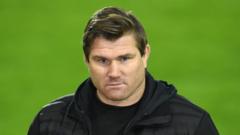Is Hibbard Right to Fire Back in the Wales Selection Controversy?

Published: 2025-09-19 12:21:15 | Category: wales
Richard Hibbard, the chief executive of Wales Rugby League, has emphasised the need for a fresh approach under new head coach Paul Berry, focusing on youth and current performance rather than past accolades. As Wales embarks on a new era, key veteran players will not return, highlighting the shift in strategy as the team prepares for the 2030 World Cup.
Last updated: 10 October 2023 (BST)
Key Takeaways
- Wales Rugby League is shifting focus to younger players under new head coach Paul Berry.
- Veteran players, including Rhys Williams, will not feature in upcoming international fixtures.
- Hibbard stresses that performance, not past achievements, determines team selection.
- Financial discussions have raised concerns among players regarding compensation for participation.
- Wales has 12 international matches planned prior to the World Cup qualification campaign.
The Shift in Strategy for Wales Rugby League
The appointment of Paul Berry as head coach marks a significant transition for Wales Rugby League (WRL). Berry, who previously led the Under-16s to notable success, is expected to instil a new ethos within the team. This change coincides with the retirement of several key players, including Rhys Williams, Elliot Kear, Gil Dudson, and Rhodri Lloyd, who have made substantial contributions to Welsh rugby league. Their absence signals a fresh start for the team as it aims for success in the upcoming World Cup cycle.
Defending a Youthful Approach
Richard Hibbard's comments reflect a commitment to a merit-based selection process. He stated, “In professional sport, no player is guaranteed a place based on past achievements alone. Positions must be earned through current performance.” This philosophy underscores the importance of adaptability and resilience, particularly in a sport that is continuously evolving.
Hibbard drew inspiration from the world of rugby union, recalling how legendary player Brian O'Driscoll was dropped during the Lions tour in 2013. Hibbard noted O'Driscoll's dignified and professional response, which has stayed with him throughout his career. Such anecdotes illustrate the need for players to demonstrate humility and dedication, regardless of their previous accomplishments.
Financial Concerns and Player Motivation
The discussion around player compensation has also surfaced during this transitional phase. Hibbard highlighted that Wales Rugby League is grappling with financial challenges, which has sparked disappointment among some players regarding the focus on payment during meetings with WRL management. “It was disappointing that some players' first concerns focused on compensation,” Hibbard remarked.
Williams, who has expressed disappointment over his exclusion from the upcoming fixtures, echoed similar sentiments. He emphasised that playing for Wales should not revolve around financial incentives but should also consider the financial implications for part-time players. “Essentially it costs you. I would have had to miss school as a PE teacher and lose money to play for my country, which is crazy,” he stated.
The Balance Between Passion and Practicality
Despite the financial constraints faced by WRL, Hibbard remains committed to fostering a culture where players are motivated by their passion for the sport rather than monetary gain. His perspective as a former player provides insight into the sacrifices made for representing one’s country. “I would have walked over hot coals to represent my country – paid or unpaid,” he declared.
This highlights the ongoing tension between the ideals of amateurism and the realities of professional sport. Players must navigate these dynamics while also contributing to a team that is undergoing significant changes.
Looking Ahead: The Path to the 2030 World Cup
With 12 international fixtures scheduled before the World Cup qualification campaign, the WRL has a busy agenda. Berry's experience and understanding of player pathways are deemed crucial as the team rebuilds. Hibbard expressed optimism about Berry’s ability to create a strong foundation for the future, stating, “His deep knowledge of the player pathways and his proven track record are invaluable.”
As Wales Rugby League transitions into this new chapter, the focus will be on developing young talent and building a competitive squad ready to tackle the challenges ahead. The players who step up during this phase will shape the future and legacy of Welsh rugby league.
Conclusion: A New Era for Welsh Rugby League
As Wales Rugby League turns the page with new leadership and a fresh strategy, the emphasis on youth and performance sets the stage for a promising future. While the departure of seasoned players marks the end of an era, the commitment to nurturing new talent suggests that Welsh rugby league is poised for growth. The upcoming fixtures will be pivotal in determining the direction the team takes under Berry’s guidance.
The journey towards the 2030 World Cup begins now. What challenges and successes await Wales Rugby League as they embrace this new era? #WalesRugbyLeague #PaulBerry #YouthDevelopment
FAQs
Who is the new head coach of Wales Rugby League?
Paul Berry is the newly appointed head coach of Wales Rugby League, succeeding John Kear.
What is the focus of Wales Rugby League under the new coach?
The focus is on developing younger players and emphasising performance over past achievements in the selection process.
Why are veteran players not featured in the upcoming matches?
Veteran players, including Rhys Williams and others, are not included as part of the team's shift towards a youthful approach for the future.
What financial challenges is Wales Rugby League facing?
Wales Rugby League is experiencing financial constraints which have affected discussions around player compensation and participation.
How many international fixtures does Wales have before the World Cup qualifiers?
Wales Rugby League has 12 international fixtures scheduled before starting their World Cup qualification campaign.


